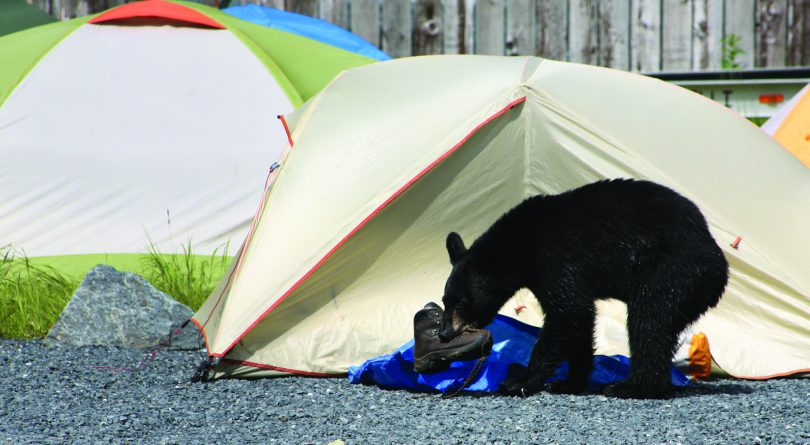By Debra Gibson Isaacs
As a Colorado camper, should you be afraid of running into a black bear?
Bears have been known to attack campers in Colorado, but, for the most part the black bears in Colorado are not naturally aggressive, according to Colorado Parks and Wildlife. Their normal response to any perceived danger is to run away or climb so they can often be easily scared away.
Most often campers see bears when they have not properly stored their food, including snacks. If you are camping west of Interstate 25, you can avoid problems by storing food, beverages and toiletries in air tight containers locked in your trunk. Also double bag your trash and deposit it in bear-proof containers at the campsite or lock it in your trunk or RV. Always make sure the campsite is clean with all leftovers put away and trash stowed appropriately.
If you are out for the day and think you might run into a bear on the trail, carry some pepper spray. After studying bears for nearly 50 years and pioneering much of the research done on black bears, biologist Lynn Rogers recommends Halt! pepper spray, which is one-sixth the potency of Counter Assault (a harsher brand), but Halt! comes out like a squirt gun rather than a fog. That minimizes the chances of the pepper spray blowing back on you.
“A black bear coming closer than you want is probably just curious and not a problem, but if it gets that close, teach it some manners with a little squirt in an eyeball,” Rogers says.
“There is only one black bear in a million that would kill someone in a predatory attack,” he says. “They come at you cautiously, wondering if they could take the food without any problem, but a little pepper spray can fix that.”
Despite being in close contact with black bears for 50 years, Rogers has never been attacked. “Even when I was holding a tiny cub I had pulled from a den and that was screaming for its mom, I did not even get touched.”
But, if they do attack, should you run from a bear?
“I hear that question frequently,” Rogers says, “and people have reacted and done everything across the board. Mostly what I hear when people talk about encountering a bear is that they ran one way and the bear ran another.”
But Colorado’s black bears aren’t the only wildlife to be concerned with while camping. Here are a few other bits of advice on other wildlife from Colorado Parks and Wildlife:
• Never feed any wildlife.
• With coyotes and mountain lions, do not run or turn your back; be as big and loud as possible.
• If a mountain lion attacks, fight back with rocks, sticks or whatever is available.
• Give any moose plenty of space and avoid any confrontation. If a moose does charge, run and get behind something solid, such as a tree, as quickly as possible.
• Don’t allow small pets to roam in red fox or coyote territory; use loud noises to scare off a fox.
• Keep a safe distance when watching wildlife in their natural surroundings; never walk up to them to get a great photograph.
Remember, when you go camping you are staying where the bears, coyotes, lions and all the other wildlife live. Be prepared and respect their home. The conflicts are usually minimal, and it’s a great opportunity to enjoy adventures in the great outdoors.

